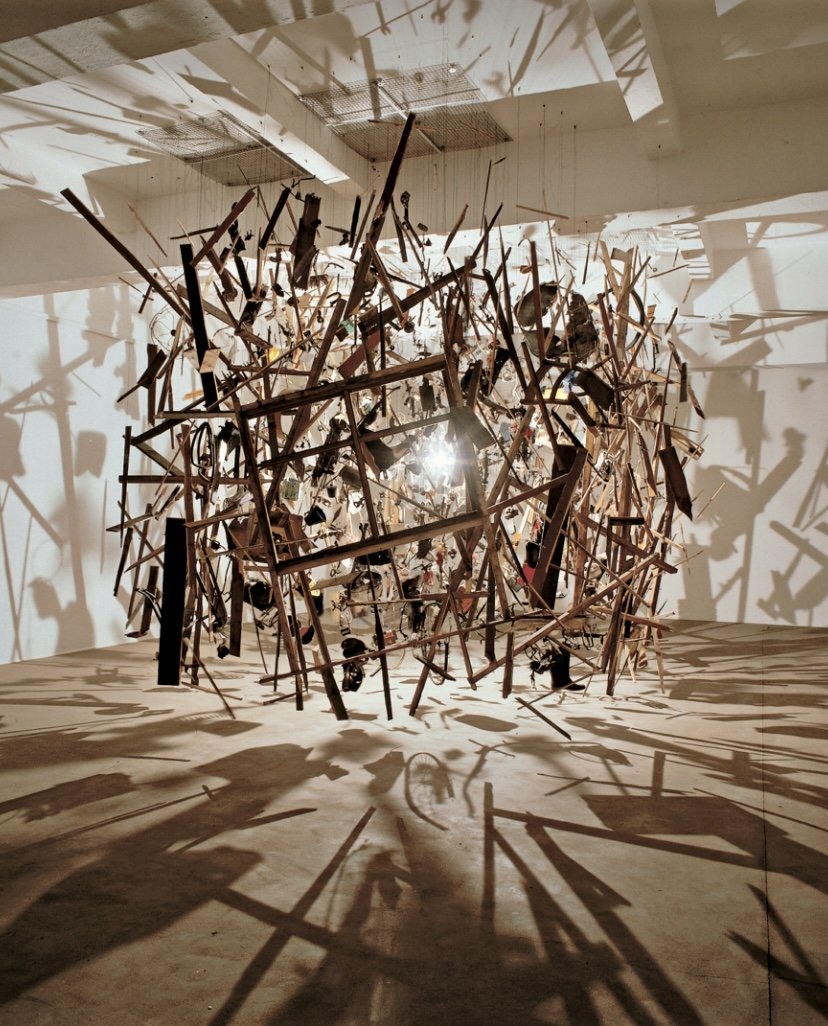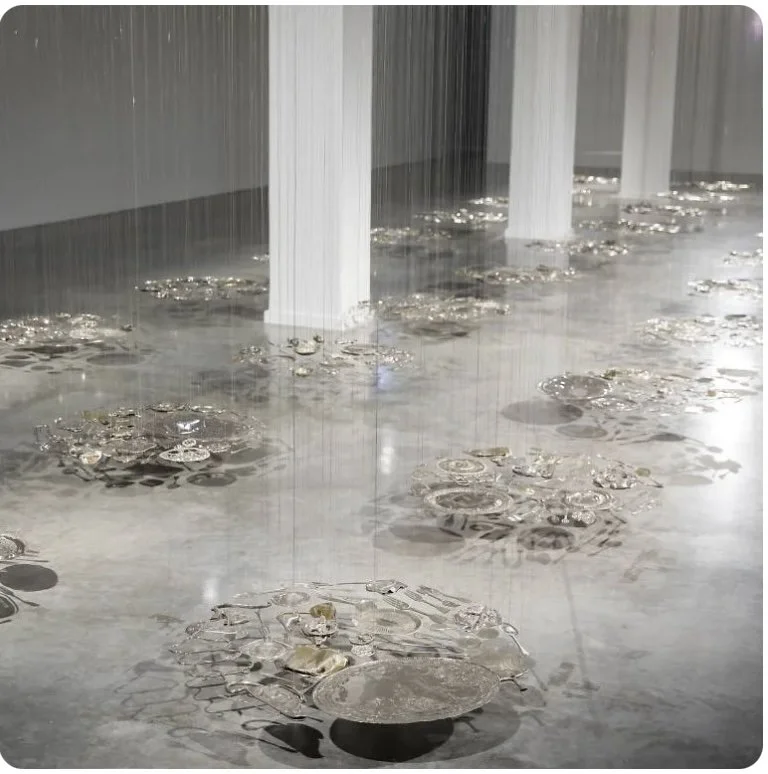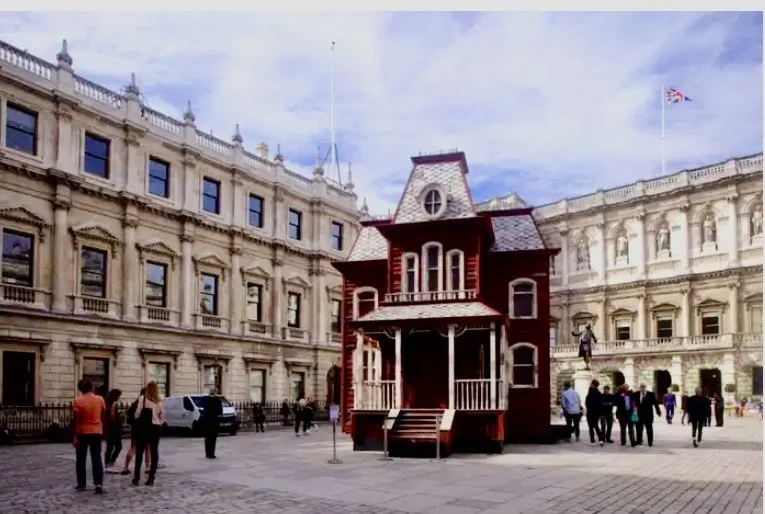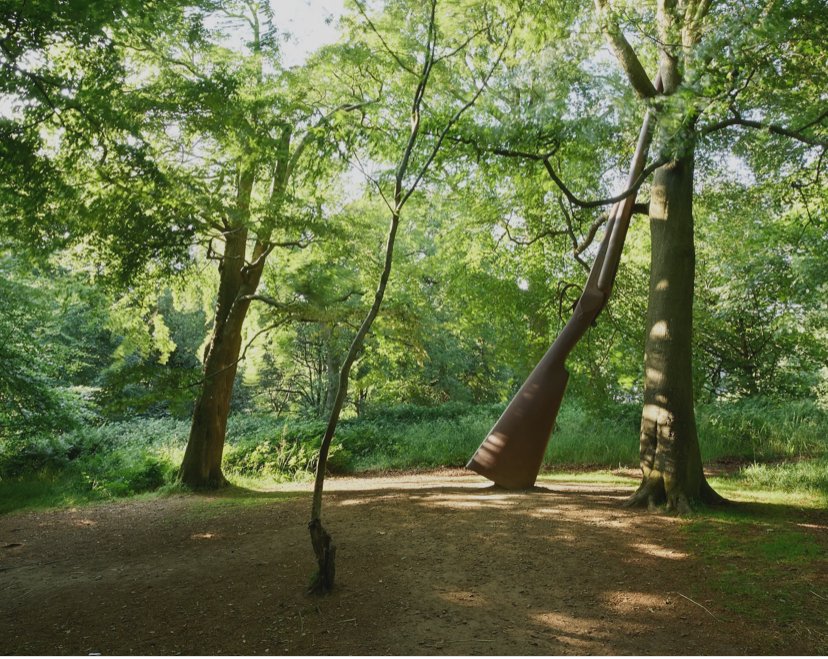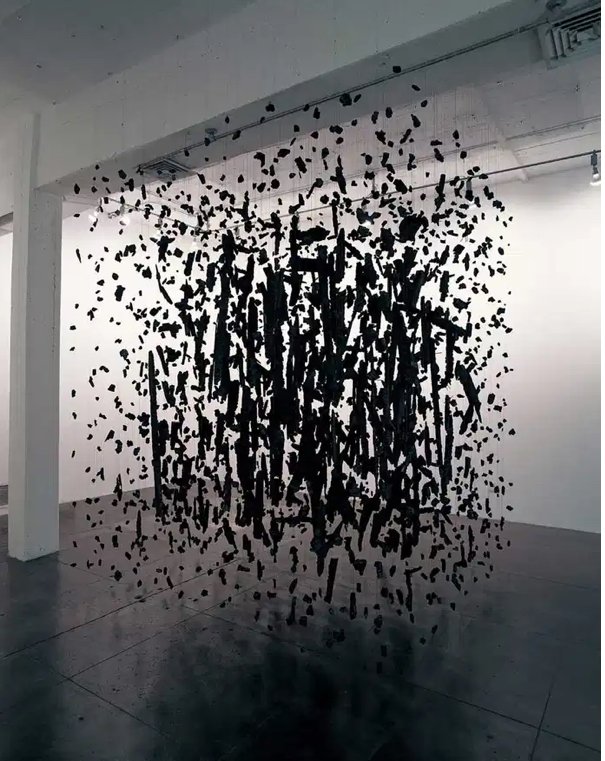Event date: 23 April 2024
Cold Dark Matter, Cornelia Parker
““Art allows me to explore my imagination””
Welcomed by Professor Richard Sawdon Smith, Head of Fine Art, NUA and Dr Rosie Gray, Curator of Modern & Contemporary Art at the Norwich Castle & Art Gallery, Cornelia Parker wowed a sell-out audience at the NUA Lecture Theatre with a witty, richly illustrated and insightful talk on her practice and the wider world.
From humble beginnings as a child in rural Cheshire helping her father on their small holding, Cornelia saw escape and play as something rare and secretive and rapidly developed an ability to “play in her imagination”. Her search for escapism might account for her early love of Tom and Jerry cartoons and Charlie Chaplin films. These influences, combined with her natural curiosity (she was known as “nosey Parker” at school), subversive mischief-making and sense of justice, have underpinned her practice ever since.
“I’m not going to show you my art. I’m going to share it with you”
Parker was lucky to have two sympathetic art teachers at school, but a school visit to London art galleries as a 15 year old had a hugely profound effect on her. Perhaps tellingly, she admits she was drawn to the works of Salvador Dali and Richard Dadd. She recalls “the whole world of art opened up: I'd never even been to a museum before. Having spent my childhood working hard, the idea that I might spend my adulthood playing began to seem quite attractive." From there, she chose to pursue the creative arts as a career - much to the consternation of her parents.
From her earliest days as an artist, Parker has used visual metaphors and storytelling to investigate the nature of many things. She says “I’m not going to show you my art. I’m going to share it with you”. She is naturally drawn to “things with a past” and their secret histories, even their “subconscious” undersides. Enter her chief protagonists, the many, often banal, “found objects” such as sheds, brass band instruments, teapots - even dust.
One can argue that Parker’s need to alter, manipulate, crush or explode these objects is a subconscious kick against her repressive upbringing. Their magical transformation into exquisitely re-created artworks such as Cold Dark Matter: An exploded view or Thirty Pieces of Silver offer a fairy-tale happy ending. Often suspended, the recreated works have a sense of delicate gravity which pulls them safely back to earth. Her witty artwork titles are arguably as thought-provoking as the work itself.
Landscape with Gun and Tree, Cornelia Parker
“I like it very much when worlds collide”
Her exploration of more controversial subjects such as guns in Embryo Firearms and Landscape with Gun and Tree (after Gainsborough’s Mr and Mrs Parker) or pornography Pornographic Drawings, using ink solvent used to dissolve pornographic video tape, are designed to “test prejudice”.
In the same vein, Mass (Colder Dark Matter) suspending the charred remains of a church that had been struck by lightning in Texas and companion piece Anti Mass, using charcoal from a black congregation church in Kentucky destroyed by arson, court controversy but also send a powerful message of metamorphosis and resurrection.
She says “I like it very much when worlds collide”. In Parker’s case of course, this is often literally true.
Mass Colder, Darker Matter, Cornelia Parker
While Parker is highly collaborative in the realisation of her artworks, she generally prefers to work on her own without assistants. She acknowledges her “grasshopper” enquiring mind which can turn in many directions requiring an almost forensic ability to acquire new techniques (and specialist experts) to help her realise her work. It is apparent that she relishes the meticulous planning and realisation. For Parker, the process and the materials are as important as the finished object.
A perfect example of this is her work Magna Carta (An Embroidery) where Parker created a hand-embroidered version of the Wikipedia article Magna Carta, as it appeared on 15 June 2014, to celebrate its 800th anniversary. Embroiderers included members of the Embroiderers Guild, HM prisoners, Peers, MPs, judges, human rights lawyers, a US ambassador and his staff, and various public figures including Julian Assange, Jarvis Cocker and Doreen Lawrence.
Parker is unashamedly political. She has said “There’s such a freedom about being an artist.. You’re not accountable – you’re this renegade thing”. It affords her her the privilege, almost responsibility, to amplify voices that are often overlooked. She is passionate about the future, particularly global environmental challenges and issues of social justice and has joined the recently formed creatives’ think tank, Hard Act, spearheaded by Brian Eno.
Still from THE FUTURE (Sixes and Sevens) video, Cornelia Parker
Her recent work, a short film The Future (Sixes and Sevens) is a funny yet poignant examination of the future through the eyes of British primary school children. In an interview with the FT about the work, she says “I’m hoping people watching will realise that we are the adults. We can do something. The children can’t. We can’t wait for them to grow up. We have to act in every way we can”.
Going forward, Parker promises to “keep pushing the envelope”. No surprise from an artist who, according to Bloomberg, has established a reputation as “one of the most inventive and quietly provocative artist of her generation.
Our thanks go to NUA for kindly hosting this talk which is part of ncas’ ongoing talks programme.

